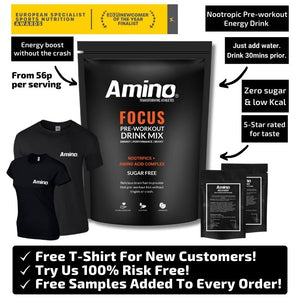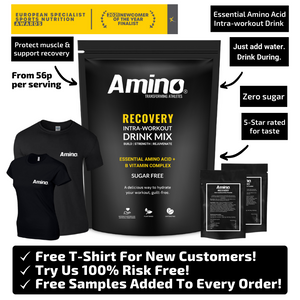 If you like to push yourself to succeed, whether that be by achieving a promotion at work or repping a heavier weight, you’re probably familiar with feelings of stress.
If you like to push yourself to succeed, whether that be by achieving a promotion at work or repping a heavier weight, you’re probably familiar with feelings of stress. Indeed, most of us now spend much of our time in a mid-way state – neither fully relaxed or fully stimulated.
But by finding ways to support our body’s stress response, we can not only give our well-being a boost but train our bodies to cope with it, boosting our chances of success.
So, what to do when you’re stressed? Here’s 4 ways you can start supporting your body’s stress response today.
1. Breathe
One of the best ways to help with stress is to start doing breathing exercises. Stress and breathing are strongly linked. When we become stressed, our breathing speeds up and becomes heavier. This is because the sympathetic nervous system has been triggered, also known as the system that initiates our flight or fight response.
Conversely, slow, deep breaths trigger the parasympathetic nervous system, which is what helps our bodies to recover and relax.
Practising slower, deeper breaths has therefore been linked to better stress management. Studies have shown that more mindful breathing can improve cognitive performance, lower feelings of depression and reduce blood pressure.
Mindful breathing can be practised sitting down, lying somewhere comfortable or standing up.
Try breathing through your nose and exhaling through your mouth. Breathing in through your nose means you will draw in more oxygen. Focus particularly on your exhales, making them long and slow. You may also want to try 4-7-8 breathing. Inhale to a count of 4, hold for 7 and then exhale through the mouth for 8 counts. Try repeating this 4 times a couple of times a day.
2. Get physical
Another great way to help stress is to exercise.
When we get stressed, our autonomic nervous and endocrine systems produce cortisol, adrenaline and norepinephrine. This preps our body to protect itself from a threat. But when we are in a modern day stressful situation, the perceived threat lingers, leaving our bodies in a state of heightened alert.
When we exercise, the same reactions happen. But once we finish exercising, the parasympathetic nervous system kicks in and we relax. This lowers the amount of stress hormones in our bodies.
As a result, preliminary research has shown that regular leisure-time physical activity can enhance problem-solving focus and the ability to cope with stress. It can also lead to lower anxiety by providing our brains with a ‘time out’ from our daily stresses.
Most tests have been linked with cardio, but any form of exercise that allows you to zone out will be helpful. If you want to try yoga or thai chi, for instance, you can also link it to your breathing practice.
3. Take a cold dip
There is growing interest and research into the benefits of cold water immersion and its ability to manage stress.
In theory, immersing yourself in cold water triggers the same stress response as exercise. Once out of the cold water, the stress hormones dissipate and the body relaxes.
In one notable case study, a young woman with a major depressive order was able to become medication-free by taking part in weekly open cold water swimming sessions. She remained medication-free when contacted a year later.
If you want to try swimming, make sure you get safety advice as cold water shock can be fatal. Start in summer and in the shallows, and pick a calm day. If swimming sounds a little too extreme, you can replicate it by turning the temperature to cold at the end of your shower or even washing your face with cold water every day.
4. Amino Acids
Research is still ongoing, but taking amino acid supplements may also help with stress.
Tryptophan, which is included in our RECOVERY product, can be converted into a molecule called 5-HTP, which is short for 5-hydroxytryptophan. 5-HTP is then used by the body to create serotonin, which helps to moderate our mood and feelings of happiness and well-being.
Research has found that those with low tryptophan levels have higher levels of anxiety and tension. Other studies have discovered that those with depression are more likely to have low tryptophan in their systems.
L-Theanine has also been linked to stress management. Found in green and black tea (and our FOCUS product!), it is suggested that it can help to reduce the activation of the sympathetic nervous system. In a study of 12 participants, its intake reduced heart rate and salivary immunoglobulin responses to an acute stress task. A systematic review also found that it can assist in reducing acute anxiety and stress.
Glutamine has also been put forward as a possible stress-reducer, although less research has been done in this area. It is proposed that it could stimulate GABA production, which is a neurotransmitter known to reduce anxiety. A study on mice found that glutamine supplementation was effective against mild cognitive impairment in times of chronic stress, for instance.
L-Tyrosine works a little differently. Rather than reducing stress, it ensures that the body has enough material to create dopamine, adrenaline and noradrenaline, which are released when the body is placed under stress. By having enough L-Tyrosine in your body, you can ensure that the supply of these hormones doesn’t become depleted, which can have a negative impact on your performance in a stressful situation (for instance, losing the edge in a long game of tennis). For this reason, it is a great inclusion in our drinks.
ENJOYED THIS ARTICLE?
Sources:
https://positivepsychology.com/breathing-exercises-for-stress-relief/
https://onlinelibrary.wiley.com/doi/10.1111/psyp.12678
https://link.springer.com/article/10.1007/s12671-019-01178-8
https://www.sciencedirect.com/science/article/abs/pii/S1550830721000914
https://file.scirp.org/pdf/Health_2014110711002844.pdf
https://www.apa.org/topics/exercise-fitness/stress
https://casereports.bmj.com/content/2018/bcr-2018-225007
https://www.healthline.com/nutrition/tryptophan
https://pubmed.ncbi.nlm.nih.gov/32224923/
https://www.calmclinic.com/anxiety/drugs/glutamine
https://pubmed.ncbi.nlm.nih.gov/16930802/
https://pubmed.ncbi.nlm.nih.gov/23107346/
https://www.sciencedirect.com/science/article/pii/S2352385915003138?via%b3Dihu






